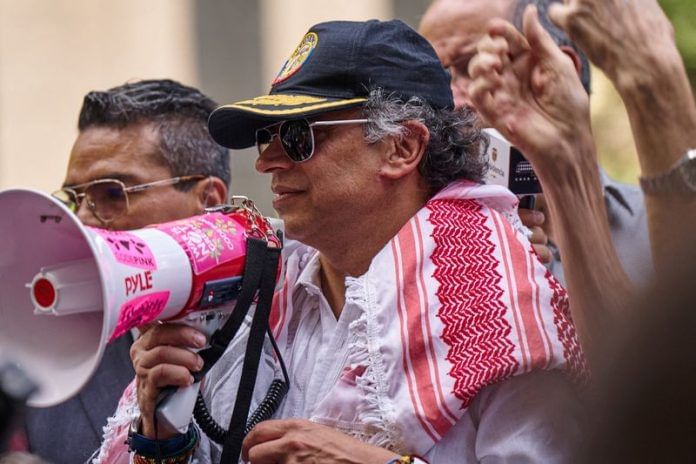By Daphne Psaledakis
WASHINGTON (Reuters) -The U.S. on Friday imposed sanctions on Colombian President Gustavo Petro, accusing him of refusing to stop the flow of cocaine to the U.S., as Washington increases pressure on the Latin American leader who has clashed with President Donald Trump.
The move marks a new low in relations between the countries. Trump has accused Bogota of being complicit in the illicit drug trade.
The rare but not unprecedented U.S. imposition of sanctions on a head of state added Petro to a short list that includes the leaders of Russia, Venezuela and North Korea.
“Since President Gustavo Petro came to power, cocaine production in Colombia has exploded to the highest rate in decades, flooding the United States and poisoning Americans,” Treasury Secretary Scott Bessent said in a statement.
“President Petro has allowed drug cartels to flourish and refused to stop this activity. Today, President Trump is taking strong action to protect our nation and make clear that we will not tolerate the trafficking of drugs into our nation.”
Petro in a post on X said he had sought to fight drug trafficking for decades.
“Fighting drug trafficking for decades, and effectively, has brought me this measure from the government of the very society we helped so much to stop their cocaine consumption.
A complete paradox — but not one step back, and never on our knees.”
Petro’s wife and son and Armando Benedetti, Colombia’s interior minister, were also hit with sanctions on Friday under the authority that allows Washington to target those it accuses of being involved in the global illicit drug trade.
Trump and Petro have clashed several times since the Republican U.S. president took office in January, including in an escalating feud stemming from U.S. military strikes on vessels allegedly transporting drugs in the region.
Last weekend, Trump threatened to raise tariffs on Colombia and said on Wednesday that all funding to the country had been halted.
Petro has pledged to tame coca-growing regions in the country with massive social and military intervention, but the strategy has brought little success.
(Reporting by Daphne Psaledakis and Doina Chiacu in Washington, Julia Symmes Cobb in Bogota and Brendan O’Boyle in Mexico City; Editing by Leslie Adler and David Gregorio)
Disclaimer: This report is auto generated from the Reuters news service. ThePrint holds no responsibility for its content.






